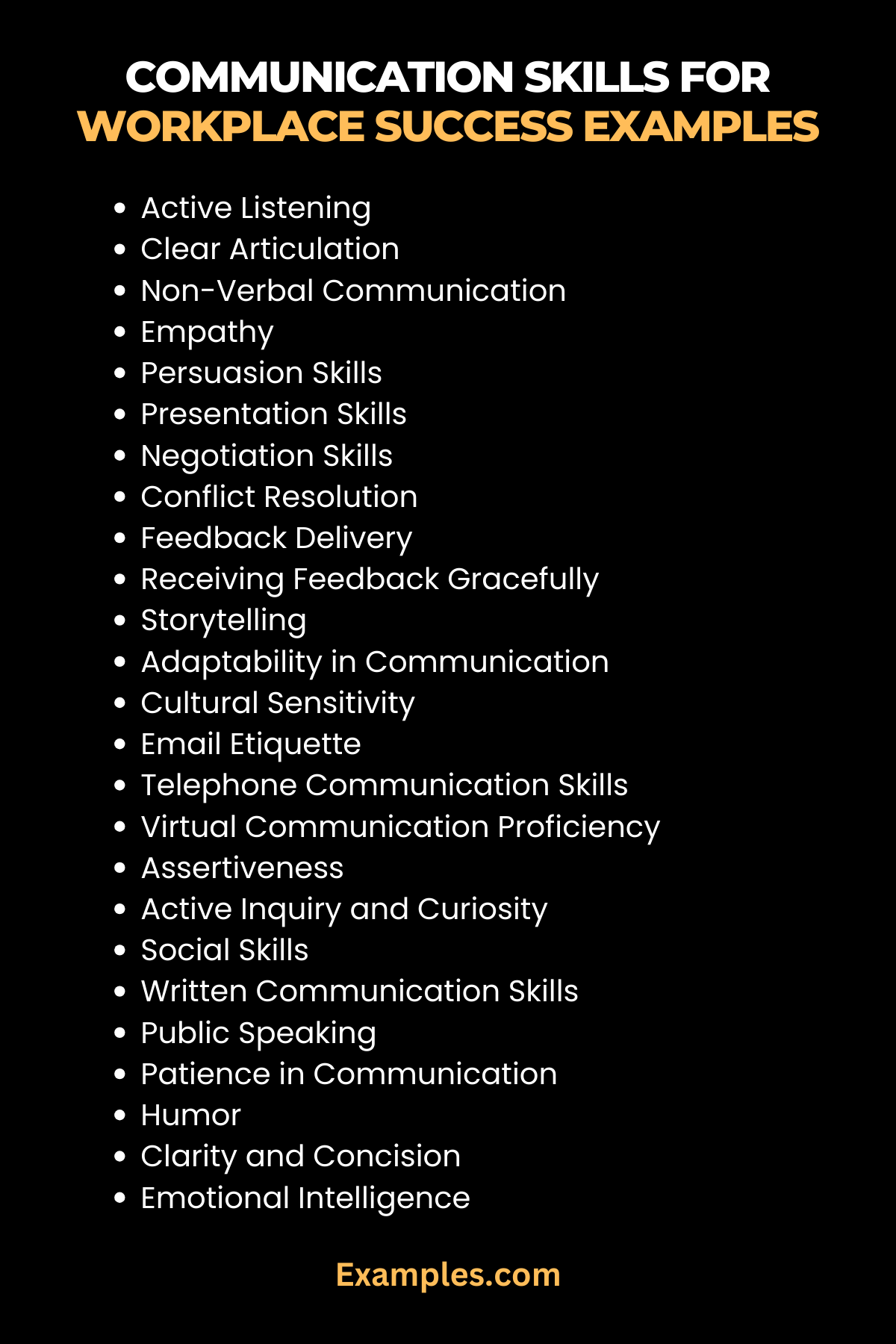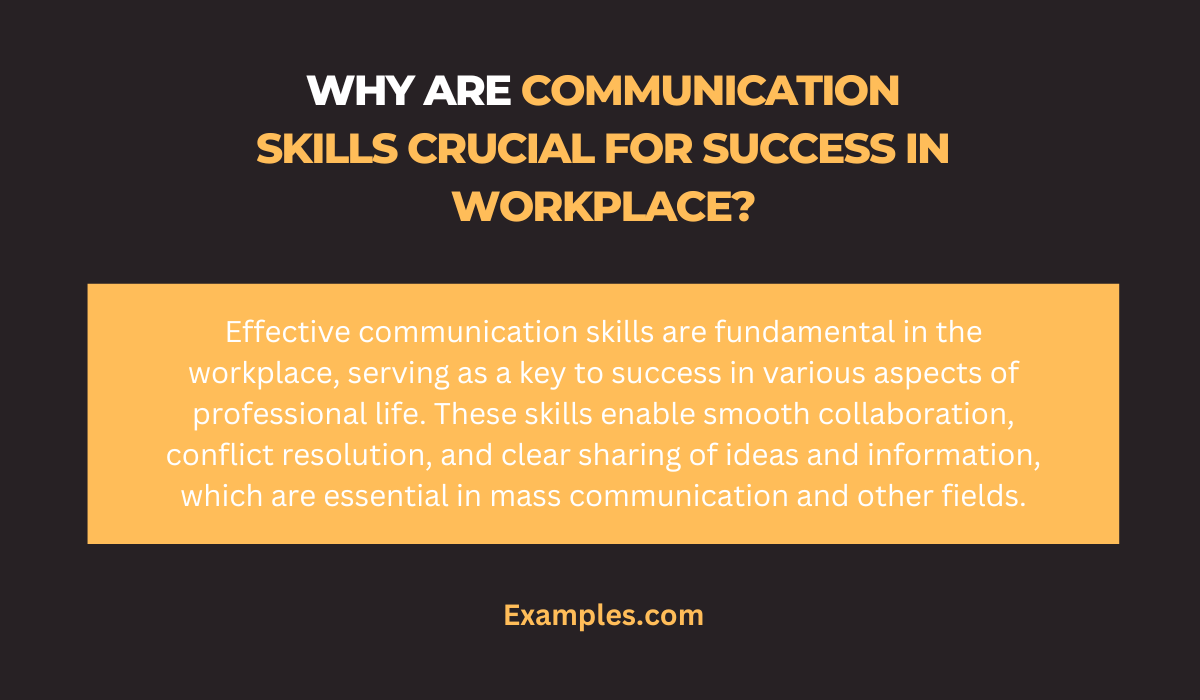29+ Communication Skills for Workplace Success Examples
Effective Communication Skills are the cornerstone of professional success. In today’s fast-paced work environment, the ability to convey ideas clearly, listen actively, and collaborate effectively is invaluable. This guide delves into the essential communication skills needed for workplace success, from mastering interpersonal interactions to navigating complex team dynamics. Understanding and honing these skills can significantly enhance professional relationships, improve team productivity, and foster a positive work atmosphere.
30 Communication Skills for Workplace Success Examples
Here are 30 examples of communication skills crucial for success in the workplace, each described with a brief explanation and the relevance of these skills in a professional context.

- Active Listening:
Active listening involves fully focusing on the speaker, understanding their message, and responding thoughtfully. It’s essential for teamwork and ensuring everyone feels heard and valued. - Clear Articulation:
The ability to express ideas clearly and concisely prevents misunderstandings and keeps communication efficient and effective in the workplace. - Non-Verbal Communication:
Body language, facial expressions, and eye contact play a significant role in conveying messages and building trust among colleagues. - Empathy:
Demonstrating empathy helps in understanding colleagues’ perspectives and fosters a supportive work environment, crucial for teamwork and collaboration. - Persuasion Skills:
Effective persuasion skills enable professionals to influence others and drive decision-making processes, essential in leadership and sales roles. - Presentation Skills:
Good presentation skills are vital for conveying information in an engaging and understandable manner, especially in meetings and client interactions. - Negotiation Skills:
Negotiation involves reaching a mutual agreement beneficial for all parties, a key skill in project management and business dealings. - Conflict Resolution:
Resolving disagreements constructively is essential for maintaining a harmonious and productive work environment.

- Feedback Delivery:
Providing constructive feedback in a respectful manner is crucial for the growth and development of team members. - Receiving Feedback Gracefully:
Being open to and learning from feedback is key for personal improvement and professional growth. - Storytelling:
Utilizing storytelling in communication can make complex information more relatable and memorable. - Adaptability in Communication:
Adjusting communication styles to suit different audiences and situations is vital for effective interactions. - Cultural Sensitivity:
Being mindful of cultural differences ensures respectful and effective communication in diverse workplaces. - Email Etiquette:
Professional and clear email communication is essential for effective digital correspondence. - Telephone Communication Skills:
Effective telephone skills are crucial for clear and professional remote conversations. - Virtual Communication Proficiency:
Mastering virtual communication tools is essential in the digital age for remote teamwork and meetings.

- Assertiveness:
Communicating assertively ensures one’s ideas and opinions are heard and respected, without being aggressive. - Active Inquiry and Curiosity:
Asking questions and showing genuine interest fosters engaging and insightful conversations. - Social Skills:
Good social skills facilitate better networking and relationship building within and outside the organization. - Written Communication Skills:
Clear and effective writing is crucial for drafting reports, emails, and other workplace documents. - Public Speaking:
Public speaking skills are important for delivering presentations and representing the company at events. - Patience in Communication:
Patience helps in dealing with challenging conversations and understanding complex issues. - Humor:
Appropriate use of humor can create a positive atmosphere and strengthen team bonds. - Clarity and Concision:
Being clear and concise prevents misunderstandings and keeps communication efficient. - Emotional Intelligence:
Understanding and managing one’s emotions and those of others leads to more harmonious workplace interactions. - Team Communication:
Effective communication within teams is key to collaboration and project success. - Listening for Understanding:
Focusing on truly understanding the speaker’s message builds stronger workplace relationships. - Responsiveness:
Timely responses in communication signify respect and efficiency. - Ability to Summarize and Paraphrase:
Summarizing and paraphrasing can clarify and confirm understanding of complex discussions. - Confidence in Communication:
Confident communication conveys competence and helps in establishing credibility.
What are Effective Communication Skills in the Workplace?
Effective communication skills in the workplace are pivotal for fostering a productive, collaborative, and positive environment. These skills enable individuals to exchange information efficiently, resolve conflicts amicably, and build strong working relationships.
Active Listening
Active listening goes beyond just hearing words. It involves attentively listening, understanding the message, and responding appropriately. In the workplace, this skill ensures all team members feel heard and valued, promoting a culture of respect and cooperation.
Clear and Concise Communication
The ability to convey ideas and instructions clearly and concisely is crucial. It prevents misunderstandings and saves time, making workplace interactions more efficient. Clarity in communication, whether in email, presentations, or meetings, ensures that all team members are on the same page.
Empathy and Understanding
Empathy in communication demonstrates an understanding of colleagues’ perspectives and emotions. It fosters a supportive work environment and aids in resolving conflicts and misunderstandings more compassionately and effectively.
Constructive Feedback
Providing constructive feedback is an art. It involves delivering suggestions for improvement in a manner that is positive and helpful, rather than critical or demeaning. Equally important is the ability to receive feedback graciously and use it for personal and professional growth.
Adaptability in Communication
Being adaptable in communication means adjusting your communication style to suit different situations and audiences. This flexibility is essential in a diverse workplace and helps in effectively managing a variety of interactions.
Confidence and Assertiveness
Communicating with confidence and assertiveness ensures your ideas are heard and considered. Assertiveness involves expressing your thoughts and needs clearly and respectfully, without infringing on the rights of others.
Effective Email and Written Communication
In today’s digital age, the ability to compose clear, professional emails and other written communications is indispensable. This skill is crucial for ensuring that digital correspondences are understood as intended.
Interpersonal Skills
Strong interpersonal skills are the foundation of effective workplace communication. They encompass the ability to interact harmoniously with colleagues, build rapport, and maintain positive relationships.
Non-Verbal Communication
Non-verbal cues like body language, facial expressions, and eye contact play a significant role in communication. Being aware of and effectively using non-verbal signals can enhance the clarity and impact of your message.
Problem-Solving and Conflict Resolution
Effective communication is key in conflict resolution and problem-solving. It involves discussing issues openly, brainstorming solutions collaboratively, and reaching amicable agreements that benefit all parties involved.
Each of these communication skills contributes to a more harmonious and efficient workplace. Enhancing these skills can lead to better teamwork, increased productivity, and a more positive work environment, all of which are essential in the dynamic field of communication skill and beyond.
Why are Communication Skills Crucial for Success in the Workplace?
Effective communication skills are fundamental in the workplace, serving as a key to success in various aspects of professional life. These skills enable smooth collaboration, conflict resolution, and clear sharing of ideas and information, which are essential in communication skill and other fields.

Enhancing Team Collaboration
Strong communication fosters teamwork by ensuring that all team members are aligned with goals and understand their roles. It leads to more effective collaboration and project success.
Conflict Resolution
In any workplace setting, conflicts are inevitable. Good communication skills help resolve disputes by facilitating open discussions, understanding different viewpoints, and finding common ground.
Building Professional Relationships
Effective communication is the cornerstone of building and maintaining healthy professional relationships. It helps in networking, mentoring, and creating a supportive work environment.
Facilitating Change Management
Changes in workplace policies, strategies, or roles require clear communication. It ensures that transitions are smooth and the team adapts effectively to new challenges.
Enhancing Employee Engagement
Employees who feel heard and understood are more engaged. Effective internal communication boosts morale and job satisfaction.
Leadership and Influence
Leaders with strong communication skills can inspire and motivate their teams. Clear and persuasive communication is crucial for driving vision and change.
What are the Methods of Communication in the Workplace?
The methods of communication in the workplace vary and play different roles in ensuring effective information exchange. Choosing the right method based on the context is crucial for effective communication.
Face-to-Face Communication
Direct, in-person interactions are ideal for complex or sensitive discussions. They allow for immediate feedback and non-verbal cues like body language and facial expressions.
Email Communication
Emails are a staple in the professional world, perfect for formal and documented communication. They are effective for sending detailed messages or information that doesn’t require immediate feedback.
Virtual Meetings
With the rise of remote work, virtual meetings via platforms like Zoom or Teams have become essential. They allow for real-time discussions with remote teams.
Telephone Calls
Phone calls are suitable for quick discussions or when seeking immediate responses. They are more personal than emails but less so than face-to-face conversations.
Instant Messaging and Chat Tools
Tools like Slack or Microsoft Teams enable quick, informal communication among team members. They are ideal for rapid queries or updates.
Reports and Written Documents
For formal communication that requires record-keeping, reports and written documents are essential. They are often used for official announcements, policy changes, or project summaries.
Social Media and Internal Networks
Social media and internal networking platforms can foster a sense of community and informal sharing of ideas within an organization.
Notice Boards and Newsletters
For broad, non-urgent communication, notice boards and newsletters are useful. They are often employed to share general information, updates, or celebrate achievements.
In communication skill and other industries, understanding and effectively using these various communication methods is key to ensuring a successful, collaborative, and efficient workplace environment.
How to Improve Communication Skills in the Workplace?
Enhancing communication skills in the workplace is essential for professional growth and effective teamwork, especially in fields like communication skill. Here are practical strategies to improve these skills:
Practice Active Listening
Active listening involves fully concentrating on the speaker, understanding their message, and responding thoughtfully. Encourage open dialogue, ask clarifying questions, and show genuine interest in your colleagues’ viewpoints.
Engage in Regular Feedback
Create a culture of constructive feedback. Regularly giving and receiving feedback helps identify areas for improvement and encourages a continuous learning environment.
Enhance Your Non-Verbal Communication
Non-verbal cues, such as body language, eye contact, and facial expressions, significantly impact how your message is perceived. Be aware of these signals and ensure they align with your verbal communication.
Develop Empathy
Understanding and sharing the feelings of others is crucial for effective communication. Empathy builds trust and strengthens professional relationships.
Tailor Your Message
Adjust your communication style to suit your audience. Consider factors like cultural backgrounds, job roles, and personality types to make your message more effective.
Improve Public Speaking Skills
Whether giving a presentation or speaking up in meetings, public speaking is a valuable skill in the workplace. Practice regularly and seek opportunities to speak in front of groups.
Enhance Your Writing Skills
In today’s digital world, written communication is as important as verbal. Work on crafting clear, concise, and professional emails, reports, and other documents.
Utilize Technology Effectively
Familiarize yourself with various communication tools and platforms used in your workplace. Whether it’s email, instant messaging, or video conferencing, using these tools effectively can enhance your communication.
Work on Conflict Resolution Skills
Learn to address and resolve workplace conflicts in a healthy, constructive manner. This involves understanding different perspectives, finding common ground, and reaching amicable solutions.
Engage in Continuous Learning
Attend workshops, seminars, or courses on communication skills. Regular learning and practice can significantly enhance your abilities.
Focus on Clarity and Brevity
Aim to be clear and concise in your communication. Avoid jargon and overly complex language that might lead to misunderstandings.
Cultivate Emotional Intelligence
Emotional intelligence involves being aware of and managing your emotions and those of others. This skill is crucial for navigating challenging conversations and maintaining positive workplace dynamics.
Improving communication skills is an ongoing process and is vital in communication skill and other industries. By focusing on these areas, you can become a more effective communicator, which can lead to improved teamwork, productivity, and professional success.
Mastering communication skills for workplace success is crucial in today’s professional landscape. From active listening to effective virtual communication, these skills foster collaboration, enhance productivity, and create a positive work environment. Implementing the strategies and tips outlined in this guide can significantly elevate your professional interactions and lead to greater success in your career, particularly in dynamic fields like communication skill.



